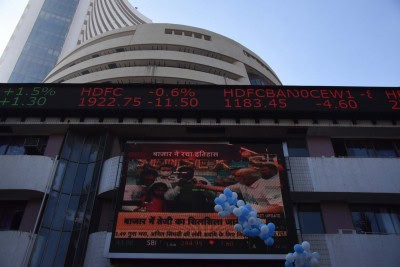Mumbai, Jan 28 : Global cues, along with profit booking, pulled equities market lower on Thursday.
Besides, the flight of foreign funds from the domestic market due to nervousness over the upcoming Budget FY21 and derivatives expiry led to the sharp correction.
Globally, Asian and European shares slipped after a major sell-off was triggered at Wall Street.
On the domestic front, NSENifty50 opened a gap down and continued to remain under pressure ahead of the Union Budget on Monday.
Among sectors realty, IT, FMCG and PSU banks fell the most.
Heavy selling was witnessed in finance, banking and IT stocks.
Consequently, the S&P BSE Sensex plunged by 535.57 points, or 1.13 per cent, to 46,874.36 points from its previous close of 47,409.93.
It opened at 46,834.57 and has touched an intra-day high of 47,172.02 and a low of 46,821.21 points.
The Nifty50 on the National Stock Exchange was trading at 13,817.55, lower by 149.95 points, or 1.07 per cent, from its previous close.
“The Nifty fell for the fifth consecutive session on Jan 28; however it did not close at the intra day lows,” said Deepak Jasani, Head of Retail Research at HDFC Securities.
“Pre-budget buildup on a small scale may begin from Friday. 13,713-13,927 could be the band of support or resistance for the near term.”
Siddhartha Khemka, Head – Retail Research, Motilal Oswal Financial Services, said: “Volatility was high during the session as futures and option contracts for the month of January expired. Even FIIs have been sellers which added to the nervousness as this sharp market rally was largely liquidity driven.”
“Going ahead, markets may continue to remain highly volatile amidst the ongoing earning season and ahead of Union Budget 2021 on Feb 1.”
Geojit Financial Services Research Head Vinod Nair said: “Market turned cautious after the unidirectional upside of the last 10 months due to ambiguity ahead the budget and profit booking in the global market due to over enthusiasm.”
“Global risk parameters increased despite the US Fed maintaining its supportive policy, due to high speculation in the equity market and likely drop in fiscal & monetary liquidity, in the future.”
Disclaimer: This story is auto-generated from IANS service.

